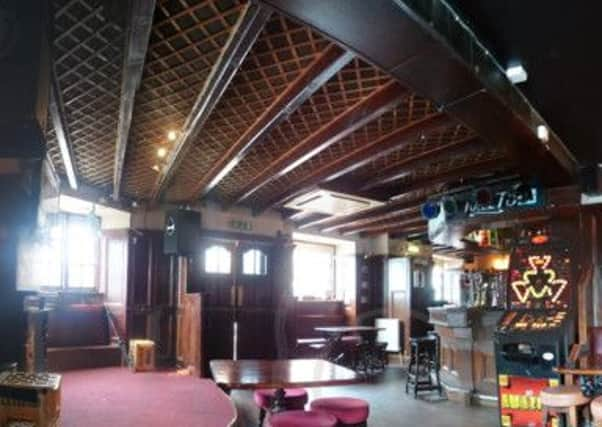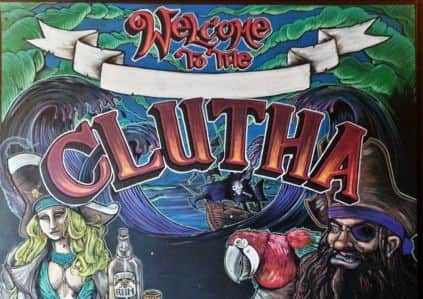Insight: The Clutha - best bar none


MUSICIAN, songwriter and former publican Brendan McLauglin carefully dusts off a terracotta sculpture of The Clutha bar which sits in his study. Created by Glasgow artist Tam Smith, it’s a replica which dates to long before McLaughlin became the bar’s owner, when it was the ground floor of a five-storey tenement building. On one wall of his living room, there is a painting by the same artist that shows it in its more familiar guise, as a distinctive, low-lying block of a building on a rare, unsanitised spot near the banks of the Clyde, a vestige of the old city, with its shipyards and foundries and working men.
McLaughlin had already restored The Scotia, the Clutha’s sister bar close by on Stockwell Street, to the cultural hub he remembered from his younger years when he bought its neighbour, then called The Merchant, in 1993.
Advertisement
Hide AdAdvertisement
Hide AdInspired by Andy Warhol, he imagined the area transformed into an ungentrified version of Greenwich Village, a hotbed of creativity where the city’s writers, musicians and political firebrands would float from pub to pub, and ideas would cross-pollinate and grow.


With a clear vision of what he wanted to achieve in his head, he set about stripping the dilapidated building back to the bare walls. “I gaffered the job because I didn’t trust anyone else to do it,” says McLaughlin, misty-eyed at the memory.
“I picked out wood for the panelling and mouldings which we doubled and trebled up to look like cornicing. I designed everything myself. It was my wee, beautiful pub.”
Even after he was forced to part with it, McLaughlin’s love for The Clutha endured, hence the myriad souvenirs – posters, political pamphlets and a violin – spread round his Cathcart home. He continued to perform there and to meet old friends. Indeed he would have probably have popped in a week past Friday, when the police helicopter crashed through the roof claiming nine lives, had he not been at his sister’s 60th birthday party.
In the days since the tragedy, it has been clear thousands of people across the city share his affection for the place. The outpouring of grief and the river of flowers that now flows alongside the Clyde is testament to a truth he understands only too well. To its customers, The Clutha was more than bricks and mortar: it was a haven, a community, a way of life.
All those who have spent time there, from the survivors who fled the falling debris to Billy Connolly who performed there and travelled from New York to lay a bouquet, have expressed the same sentiment: The Clutha was a special place which embraced all-comers and generated a sense of connectedness. It was everyone’s wee, beautiful pub.
“Not a single person ever walked through its doors who wasn’t welcomed,” writer and musician Danny Gillan, a regular in the 90s, wrote in his blog. “[It has] no truck with pretension, no desire to be a ‘destination’, no need or reason to be anything other than what it is – a good place full of good people enjoying good music and good times.”
Certainly, good music was a key part of The Clutha’s appeal. As soon as McLauglin took over, he brought in great bands: The Blues Poets, The Vagabonds and his own group the Kingston Bridge Trio, so that it was possible to wander to and from The Scotia catching one live session after another.
Advertisement
Hide AdAdvertisement
Hide AdBut it was also marked out by the charismatic and mostly left-wing figures who frequented it. There were the folk giants, such as Mick Broderick, from the Whistlebinkies; the writers, such as James Kelman, whose plan to bring Noam Chomsky to the Pearce Institute in Govan was hatched in The Scotia; and political activists such as Hugh Savage, who had helped lead the Clydeside Apprentices Strikes in 1941.
The joy of The Clutha, however, was that no-one was limited to one sphere. Literature, music and politics all overlapped. The scene seemed to spawn polymaths such as Sean Tierney, a former communist, lawyer, song-writer and librarian. As the pubs became more political, and Kelman, Savage and McLaughlin and a spattering of anarchists formed Workers’ City – a kind of backlash to Glasgow City of Culture rebranding – The Clutha also became a focal point for action nights when illegal fly-posting would lead to police chases.
The pub’s history is long and kenspecle. Long before its 1960s heyday, when together with The Scotia, The Clutha (known as The Popinjay, then The Weemann’s) became the centre of the burgeoning folk/political scenes, it was already part of the city’s story.
Glasgow’s second-oldest pub, it was first granted a licence in 1819 and had an array of interesting landlords over the next 150 years. One, George Johnson, who bought it in 1892, was a big-wig in Cambuslang, where he was secretary of the local football team and bought instruments for the local brass band. Another, James Omand, who had it in the 1950s, was stabbed while trying to eject a gangster.
“The area’s reputation for music goes back to the 1930s when it was banned in pubs,” says John Gorevan, author of Old Glasgow Pubs and Publicans. “A lawyer, an accountant and a businessman had a room at the back of The Victoria pub [next door to The Clutha] so they could have a Burns Night involving a meal and a sing-song. Gradually this spilled out to other establishments.”
It was extraordinary circumstances, however, that led 60s folk singers and activists to its door. For many years the pubs had done a lively trade catering for theatre-goers at the nearby Metropole, but in 1961 it burned down and custom fell away.
At that time, folk musicians, including Billy Connolly and fellow Humblebum Gerry Rafferty, frequented The Marland, while members of the Govan and Gorbals Young Socialists, which was led by the now Labour peer Gus Macdonald, and included Tierney, hung out in Kinning Park. But then the socialists got barred from their pub and The Marland was demolished. “The story is that the two groups were both looking for somewhere new to go and they decided to visit The Scotia on the same night. Tierney and Connolly had been at school together and spotted each other and, in that instant, two worlds collided.”
From then on The Scotia became their HQ, with The Weemann’s providing extra space for the overspill. In fact, the two bars became almost inseparable, with musicians and customers from one invariably ending up in the other.
Advertisement
Hide AdAdvertisement
Hide AdAs many of those who started off in the bars went on to greater success, they began to attract an international reputation, with folk singers coming from the US. One night, legend has it, Pete Seeger and Cisco Houston dropped in, though, sadly, they’d left Woody Guthrie at Betty’s Bar on the Clydeside.
McLaughlin first set foot in The Scotia in 1967, a 16-year-old boy on the look-out for an escape from Toryglen. Soon he was spending all his time in there and The Weemann’s, where musician Eric Cuthbertson taught him to play the guitar.
“It was the summer of love and all the girls were wearing cheesecloth vests with nothing under so a wee, shy boy like myself had to avert my eyes,” he says. “But the pubs changed my life. I was mesmerised by what I saw there. It made me want to get involved with music and writing instead of hanging out with the lads from the scheme.”
McLaughlin trained as a telecoms engineer, then studied economics and sociology at university. By the time he took over The Scotia, it had become a bikers’ pub, while The Merchant had a handful of customers some of whom were prostitutes driven out of Anderston.
Reclaiming The Scotia for the old crowd was hard work. McLaughlin received threats from the bikers and other customers were too scared to come in, though nightly gigs, kicked off by Hamish Imlach, helped it re-establish its reputation.
After buying The Clutha, however, McLaughlin closed it for six weeks and by the time it reopened all the old customers were gone. As a bit of a gimmick, McLaughlin set up a competition to rename it, settling on its original title – The Clutha Vaults – because Clutha was the Roman name for the Clyde.
As with The Scotia, the emphasis was on the arts; soon the writers’ nights and literary launches which had been held in The Scotia transferred to The Clutha’s more intimate surroundings and McLaughlin began to invite poets, including John McGarrigle, who died in last weekend’s crash, to perform their work there.
But it also provided a forum for the less experienced. Johnny Gardner, a former habitue of Paddy’s Market, was a regular of both pubs. “I was known as Johnny Guitar more because I collected them than because I played them,” he says, “but one night someone shouted out ‘Johnny Guitar is in’. So the MC, believing I was a player, offered me a floor spot. I passed go and became a frequent performer and stayed for sessions with the house guitar.”
Advertisement
Hide AdAdvertisement
Hide AdA friend and neighbour of Mark O’Prey, who was also killed, Gardner has fond memories of all the people who gave the pub its distinctive character. “There was big Chris, a big burly bearded man,” he says. “You would go in for one pint to chat to him and you could not leave. Life itself was being created in his patter.”
McLaughlin sold first The Clutha and then The Scotia, but the new owners of both pubs have kept the ethos going and he – along with many others – have kept on drinking there. Most Fridays he sits with Kelman in the part of the bar where the helicopter crashed. Last week, his son Kevin, also a musician, was helping with the sound for Esperanza, the ska band playing in The Clutha, and another ska band Mitre 5, which was playing at The African and Caribbean Centre in the Merchant City, and so was between the two.
When McLaughlin heard about the accident he rushed into the city, picked up Kevin at the African and Caribbean Centre and headed for The Clutha. He cries as he talks about standing outside his old pub as texts came in from across the world asking if he and others were all right.
“Even if like me, you didn’t go so often any more, you still felt connected to the place,” says Gardner. “That’s why folk who hadn’t been there for a year would still be checking on those they knew, why people were hugging when they realised they were OK.”
Over the next few days, the regulars, who have so often rallied round as others married, divorced or died, will be paying their last respects at a succession of funerals. But attention is already being given to ensuring The Clutha lives on. Fittingly, given its past, ad-hoc gigs are springing up all over the city to raise money for the beareaved and to help with the rebuilding. Owner Alan Crossan has pledged to return the pub to its former glory.
“The Clutha has long been threatened with demolition,” says McLauglin. “It stands at the gateway to the city and from time to time developers want to get rid of it and build a smart hotel, but after this it will not be knocked down.”
If it is rebuilt, a plaque to the dead will no doubt be erected. But a better memorial would be the return of camaraderie and kinship The Clutha is famous for.
“These poor people have died, but can you imagine how they are going to be honoured forever in that place?” McLaughlin says. “They will never be forgotten.” «
Twitter: @DaniGaravelli1